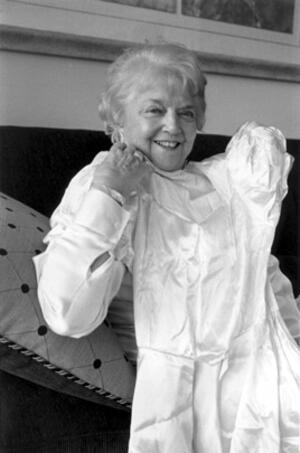Dorothy Muscatel
A vibrant social organizer, Dorothy Franco Muscatel was born in Seattle in 1917 to parents who, in 1910, were among the first Sephardic Jews to immigrate to Seattle from Rhodes, Greece. Her parents and grandmother were instrumental in creating important Seattle Jewish institutions, including the Sephardic cemetery. Dorothy learned from their example. Her achievements include helping form Seattle chapters for The City of Hope and Guide Dogs for the Blind; and service as president of the Seattle Sephardic Sisterhood and Sephardic Bikur Holim Ladies' Auxiliary. Married to Jack Muscatel and mother of three, Dorothy continued to shine the light of her family and herself on Seattle’s Jewish and secular communities until her death on December 26, 2003.
Dorothy discusses her family background, her parents' immigration from Rhodes, Greece, to Seattle, Washington, and the history of Congregation Ezra Bessaroth, where her father, Marco Franco, served as president. She describes the values she learned from her parents and grandparents, her father’s community services, and how she balanced her creative drive with her own civic engagement and volunteerism. Dorothy details her upbringing and childhood in Seattle, including her close relationship with her grandparents, the loss of her three-year-old brother, and the origins of Dorothy’s love of art and talent as a seamstress. Her charitable efforts also started at an early age. Dorothy raised money for Neighbors in Need by selling handbags she made at Glendale Golf Club. When she was ten years old, Dorothy worked on Al Smith’s presidential campaign, and in high school, she worked at the Jewish Welfare Board. After high school, Dorothy became more actively involved in nonprofits serving the Jewish community. She was involved in the Junior Sephardic League, Mizrachi women, and "The Spinsters," a social club that raised money for those in need. She served as Mobilization Chair for the Federated Jewish Fund (now The Jewish Federation of Greater Seattle), was President of the Sephardic Sisterhood and the Sephardic Bikur Cholim Sisterhood, and was active with the Seattle Talmud Torah and the March of Dimes. Dorothy tells the story of how she and her friends formed Seattle chapters of City of Hope and Guide Dogs for the Blind in Seattle. She explains how she balanced motherhood with her volunteer work and the rewards of both. Dorothy talks about how she met her husband-to-be, Jack Muscatel, their wedding, honeymoon, and marriage. Motherhood presented many challenges for Dorothy. She describes her parenting style and gives advice to young mothers. Finally, Dorothy reflects on her role as a grandmother, her involvement in Pioneer Square Theater, her leadership skills, and her current pulmonary illness.



